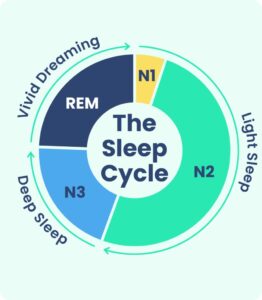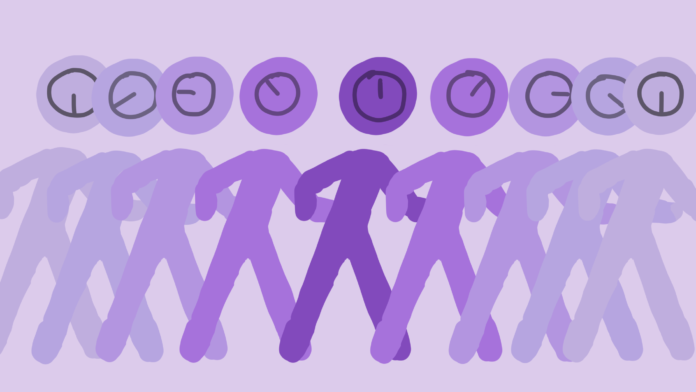Given its critical importance to our health and well-being, sleep is an essential and fundamental aspect of our lives. Our heart, immune system, metabolism, respiratory system, and circulatory system are all impacted by sleep. Understanding the concept of sleep cycles can significantly impact the quality of our rest. Sleep cycles, consisting of various stages, play a crucial role in physical and mental rejuvenation. This article aims to explore the different stages of sleep and provide tips on how to maximize your sleep cycles for a more restorative night’s sleep.

The Sleep Cycle
Sleep cycles are intricately structured patterns that govern the various stages of sleep, each contributing uniquely to the overall restoration and well-being of the body and mind. There are four distinct stages in the sleep cycle: REM (rapid eye movement), NREM1, NREM2, and NREM3 (deep sleep or slow-wave sleep). NREM1 marks the transitional phase from wakefulness to sleep, lasting only a few minutes, and sets the foundation for the deeper stages that follow. NREM2 represents true sleep, which is characterized by decreased muscle activity, decreased body temperature, and a slowing heart rate and lasts about 10–25 minutes. This stage of sleep plays a vital role in memory consolidation and learning. NREM3, a deep sleep stage characterized by delta brain waves, is essential for the body’s physical recuperation or restoration because it stimulates the release of growth hormones, the immune system, and muscle repair. The last phase of sleep, known as REM sleep, is characterized by vivid dreams, fast eye movements, and brain activity similar to that of wakefulness. This stage is essential for memory consolidation, emotional regulation, and cognitive function. The sleep cycle is not something that happens once per night. On most nights, a person goes to 5 to 6 sleep cycles. A balanced distribution of the different stages of sleep is ensured by the cyclical nature of sleep, which is essential to its effectiveness. It is important to note that the length and distribution of each stage can change during the course of the night, with REM sleep lasting longer in the morning and deep sleep mostly happening in the earlier cycles.
The Key 90 Minutes
The concept of 90-minute sleep cycles is rooted in the understanding of the human sleep architecture, characterized by distinct stages that repeat in a cyclical pattern throughout the night. Each complete sleep cycle, which typically lasts about 90 to 110 minutes, is crucial for overall health and well-being. Understanding the importance of these cycles sheds light on the significance of maintaining a consistent and adequate sleep duration.
Optimizing the distribution of sleep stages is a crucial feature of the 90-minute sleep cycle. The NREM1 and NREM2 lighter stages, NREM3 deeper slow-wave sleep, and the REM (rapid eye movement) stage comprise a full cycle. Each stage serves a unique purpose in physical and mental restoration. While REM sleep is necessary for emotional regulation and cognitive function, NREM1 and NREM2 aid in early relaxation and memory consolidation, and NREM3 is necessary for physical recovery. People can benefit from a balanced distribution of these stages throughout the night by following 90-minute sleep cycles. Sleep cycles guarantee a thorough and all-encompassing restorative experience for the body and mind, addressing the mental and physical dimensions of health. Achieving multiple complete cycles maximizes the body’s ability to repair, heal, and consolidate memories by allowing for a thorough exploration of the various stages of sleep.
The 90-minute sleep cycle also corresponds with the natural ultradian rhythms that control our physiological functions. These rhythms operate in cycles of approximately 90 minutes, influencing factors such as alertness, focus, and productivity. People who sleep in accordance with these innate cycles may discover that they wake up more easily and feel more rested because their sleep is in harmony with their body’s internal clock. Maintaining regular sleep cycles is also essential for controlling the circadian rhythm. The circadian rhythm, also known as the internal body clock, is triggered by light and dark in the environment. Consistent sleep habits aid in regulating the circadian rhythm, fostering a more robust and consistent sleep-wake cycle.
In summary, the significance of 90-minute sleep cycles lies in their capacity to facilitate a comprehensive and balanced restorative process. People can improve their physical and mental recovery, sharpen their cognitive abilities, and promote their general health and well-being by honoring their body’s natural sleep cycle. Cultivating a healthy sleep routine begins with making consistent and adequate sleep a priority in line with these cycles. This optimization entails establishing restful surroundings and embracing healthy sleeping practices. Maximizing the benefits of each sleep stage requires a consistent sleep schedule, a calming bedtime ritual, and a sleep-conducive environment that includes elements like darkness and a cool temperature. Knowing the mechanics of sleep cycles enables people to prioritize good sleep hygiene, which improves sleep quality and promotes general health and vitality. So, next time, whenever you are going to bed or taking a nap, remember to take them in 90-minute intervals for well-rested sleep.
Sources:
Cherry, Kendra. “The 4 Stages of Sleep (NREM and REM Sleep Cycles).” Verywell Health, Verywell Health, 11 May 2023, www.verywellhealth.com/the-four-stages-of-sleep-2795920.
Eugene, Andy R, and Jolanta Masiak. “The Neuroprotective Aspects of Sleep.” MEDtube Science, U.S. National Library of Medicine, Mar. 2015, www.ncbi.nlm.nih.gov/pmc/articles/PMC4651462/.
“Stages of Sleep: What Happens in a Sleep Cycle.” Sleep Foundation, 8 Dec. 2023, www.sleepfoundation.org/stages-of-sleep.
“What Happens during Sleep.” Sleep Doctor, 19 July 2023, sleepdoctor.com/sleep-faqs/what-happens-when-you-sleep/.
“Why Is Sleep Important?” National Heart Lung and Blood Institute, U.S. Department of Health and Human Services, www.nhlbi.nih.gov/health/sleep/why-sleep-important.

